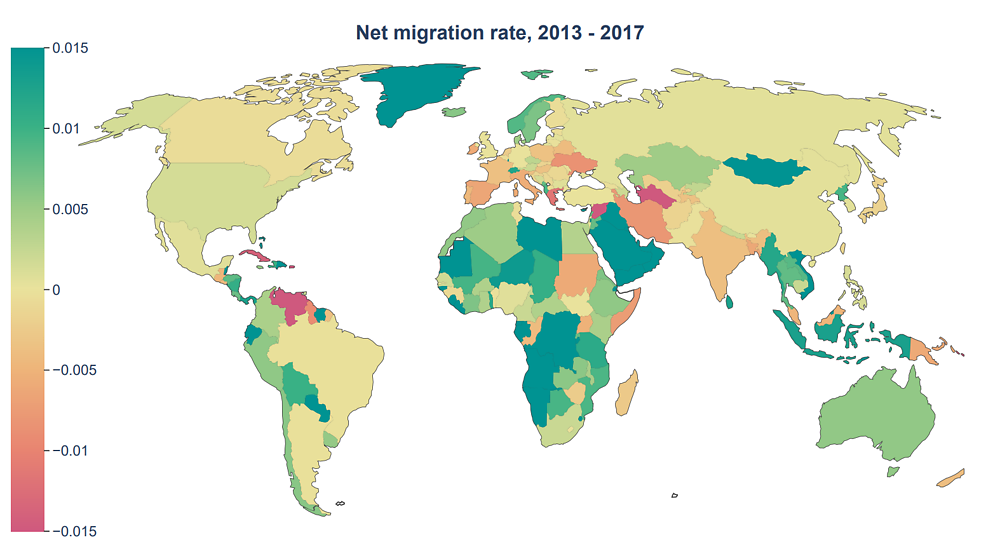Arbeitsbereich
Migration und Mobilität
Auf einen Blick
Projekte
Publikationen
Team
Projekt
Scholarly Migration Database
Aliakbar Akbaritabar, Tom Theile, Emilio Zagheni, Maciej Danko, László Németh; in Zusammenarbeit mit Ridhi Kashyap (University of Oxford, Vereinigtes Königreich von Großbritannien und Nordirland), Francesco C. Billari (Bocconi University, Milan, Italien), Guy Stecklov (The University of British Columbia, Vancouver, Kanada)
Ausführliche Beschreibung
The main goal of the Scholarly Migration Database (SMD) is to document patterns and trends of scientific mobility across time and space and to facilitate future research. It does so by offering estimates that are prepared in a consistent and systematic way, using state-of-the-art demographic and statistical methods. We leverage and repurpose proprietary and open-access bibliometric data from scientific publications to produce stock and flow data on scholarly migration events worldwide. Bibliometric data (metadata extracted from scientific publications) have proven key for demographic research on the specific case of scholars as a subset of the high-skilled population. Repurposing these data, and using academic affiliation addresses, allows us to construct the mobility trajectory of academics. We use these data as a novel source of digital traces and repurpose them to facilitate answering questions on scholarly migration flows and stocks.
Our metadata of publications come mainly from Elsevier’s Scopus, which is a proprietary and licensed database. Scopus data are provided to the Max Planck Institute for Demographic Research by the German Competence Network for Bibliometrics through the Max Planck Digital Library (MPDL). As we develop our methods, we expect to leverage publicly available bibliometric databases, such as OpenAlex, too. The geographic scope of SMD includes all countries for which the data are available in Scopus, and it covers the period 1998–2017.
The first version of the SMD was finalized in 2023. The SMD is an active and continually evolving project favoring research on the migration of scholars. Its aims are achieved in part by making estimates and statistics obtained from bibliometric data more widely accessible. The SMD has a growing community of dedicated scientists, students, and research support staff who are both contributors to and users of the database.
Globale Netto-Migrationsraten

Internationale Nettomigrationsraten (NMR) weltweit auf der Grundlage von Scopus-Daten. Die Nettomigrationsraten von Wissenschaftlern weltweit aus den Jahren 2013-2017 auf der Grundlage von Scopus werden als Rate pro 1 000 aktive Wissenschaftler dargestellt. Rot gefärbte Länder weisen eine negative Nettorate auf, d. h. sie senden mehr Wissenschaftler ins Ausland als sie Wissenschaftler aufnehmen. © Akbaritabar, A., Theile, T. & Zagheni, E. Global flows and rates of international migration of scholars. WP-2023-018
Bildung und Wissenschaft, internationale Migration, ethnische Minderheiten, interne Migration, Wohnsituation, Urbanisierung, Migration, Statistik und Mathematik
Afrika, Amerika, Asien, Europa, Welt
Publikationen
Akbaritabar, A.; Dańko, M. J.; Zhao, X.; Zagheni, E.:
Proceedings of the National Academy of Sciences of the United States of America 122:15, e2424521122–e2424521122. (2025)

Akbaritabar, A.; Theile, T.; Zagheni, E.:
Scientific Data 11:816, 1–14. (2024)

Akbaritabar, A.; Theile, T.; Zagheni, E.:
MPIDR Working Paper WP-2023-018. (2023)

Şanlitürk, A. E.; Zagheni, E.; Dańko, M. J.; Theile, T.; Akbaritabar, A.:
Proceedings of the National Academy of Sciences of the United States of America 120:4, e2217937120–e2217937120. (2023)
